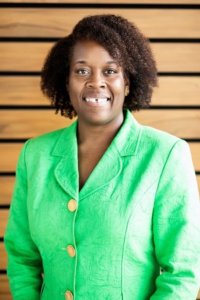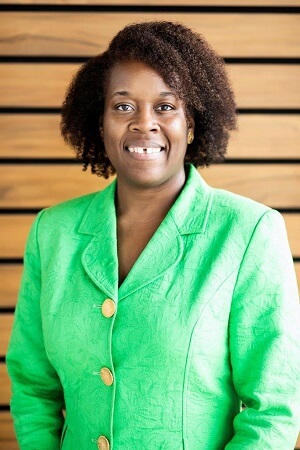An Interview with Kiesha Davis, Director, Partnership and Capacity Building, Deaconess Foundation
For more about the series, Black & Bold: Perspectives on Leadership, click here.
Kiesha Davis, Director, Partnership and Capacity Building, Deaconess Foundation
Whimsical. Compassionate. Thoughtful.
Tell me about your current role?
I serve as Director of Partnership and Capacity Building at Deaconess Foundation (in St. Louis) and in this role, I steward a program of trust-based philanthropy to build power and advance the Foundation’s agenda for child well-being. I work alongside advocates and policy leaders to create conditions that improve the likelihood of young people in the region having a successful pathway to adulthood. The Foundation has made grants since late 1990’s and uses a progressive approach to grantmaking. I’m excited to support work in my hometown that is being recognized nationally. There have been a lot of shifts in philanthropy centering racial equity and addressing public policy’s impacts on marginalized communities. It’s a fortunate time for me to be in this place and space.
If there was a soundtrack of greatest hits related to your career, what would make the list and why?
“Freedom” by Beyoncé is a song that got me through some tenuous times. I was experiencing challenges in the work environment as well as family losses…this song was a reminder to me that I didn’t have to stay bound in a place that was holding me back.
I’m a big Beyoncé fan, so I’ll also throw in My Power from The Lion King: The Gift album. It’s all about exercising one’s voice and power and not letting anyone or anything take that away. I appreciate the theme driven by Black women’s voices, because often society does not honor the power that we hold, so we must constantly use it.
Tye Tribbett’s “He Turned It” makes me think of the moments in life that were challenging and the opportunity to overcome those moments. When it’s all said and done, those moments don’t last always. God can turn it around. I’m a person of strong faith and the song is a reminder that you don’t have to be sad all the time; there are moments of joy and happiness in the future.
And lastly, “Hate on Me” by Jill Scott was my hype song when it came out. There are obstacles we face in life, whether an actual person or other issues, and regardless I have the ability to strut through and like the song says, “I’m gonna do me” regardless.
Work in the social sector can be very personal and linked to one’s values. Can you think of a time when your values were in tension during your career and how you reconciled that tension or not?
As a Black woman I have encountered many situations that have challenged my values and given me pause about my purpose in the work. During the Ferguson uprising, I was employed with the County government in a department that was tasked with providing access to behavioral health services to children and youth. When the protests started, I had to navigate between my dual consciousness as a “public servant” and a Black woman who recognized the pain that was being expressed by members of my community in the wake of Michael Brown, Jr.’s murder. I resolved to use my position to make sure that resources that I had influence over were made available to groups and communities that needed them most. So, while I may not have been in the action of protesting nightly, I was creating pathways for children and youth to get access to needed mental health counseling and supportive services to help them cope with the trauma they were experiencing at the time. (Kiesha Davis pictured at right.)
Can you share an experience in the workplace where you have had to reclaim your time? What was the context? How did you navigate it? What was the outcome?
This reclaiming my time moment harkens back to my time in Memphis. From starting my career working in the St. Louis philanthropic field and having a modicum of success, I reached a point where I felt like I had hit a ceiling. I felt that there were limited opportunities available for me and l was being discounted for other roles based on a variety of factors. My pivot to Memphis was a reclamation of the trajectory of my career. The transition afforded me the opportunity to build my professional repertoire and capital, and to excel in a space and place where there were no preconceived notions about me and what I brought to table.
Going to Memphis I knew I was dope and had a lot to offer which allowed me to continue to grow my skills in new ways. That time allowed me to return to St. Louis in a way that opened new pathways for my career to evolve. I reclaimed my narrative. Whatever the previous misconceptions were about me, I was able to shift and have people see me in a new way…a more evolved version of myself.
What’s your approach to self-care? Are there any rituals you use to survive and thrive?
One thing that has shaped me greatly is the loss of my mom, grandmother and two uncles largely representing the maternal arm of my family. In the wake of those losses over the last five years, a new perspective has emerged for me regarding the great importance of surrounding myself with family and other people I love. Transitioning to Memphis was a boon to how my career has evolved, but I had a sense over time that the experience wouldn’t likely last for the long-term. I knew I wanted to create space for life-work balance. Being in proximity to loved ones was a major factor in my transition back to St. Louis.
Second, being a person of faith and having a prayer life has kept me grounded and assured that I am cared for regardless of moments when I feel like an imposter and feel that the pressure of work coming down on me. Prayer has been central to helping me navigate and understand my bigger purpose and the forces guiding my life every day.
We come from a resilient and strong lineage. How would you describe the type of ancestor you want to be and why?
I want to be a gracious ancestor and known as one who was kind to others. I think we all deserve grace. If I can extend that to someone — because I know so many times grace has been extended to me — it would make me feel like I am living in my purpose.
What advice would you offer other Black women trying to develop or amplify their voice and become self-advocates?
Akin to some of the evolution talk earlier, my voice has evolved over time. Claim the agency to use your voice. I’ve realized it’s important to offer my perspective and share my experiences of a child from a single parent home in a “low income community.” I’m often sitting across the table from folks who don’t have those lived experiences. It is important that we speak for those who are not in the room and recognize that what we say may not always land as intended but speak it anyway. If we don’t speak, then the conditions and experiences of our community might not get recognized so that we can work to change those conditions for the better.
If you could change the social sector in a way that would benefit, lift up, or affirm Black women, what would that change be?
A key for me in my career has been having opportunities that helped me grow my skills and professional network and to see other examples of women of color working in roles that I aspired to. I had a paid internship in high school at United Way. At the time, the first Black woman CEO was Charmaine Chapman. It made me believe something like that was possible. Creating more mentorship and sponsorship opportunities is key. Creating pathways where they don’t currently exist for Black women and making room for their potential. Advocating for their cause when they are not in the room. Affirm the brilliance of Black women.



Comment section